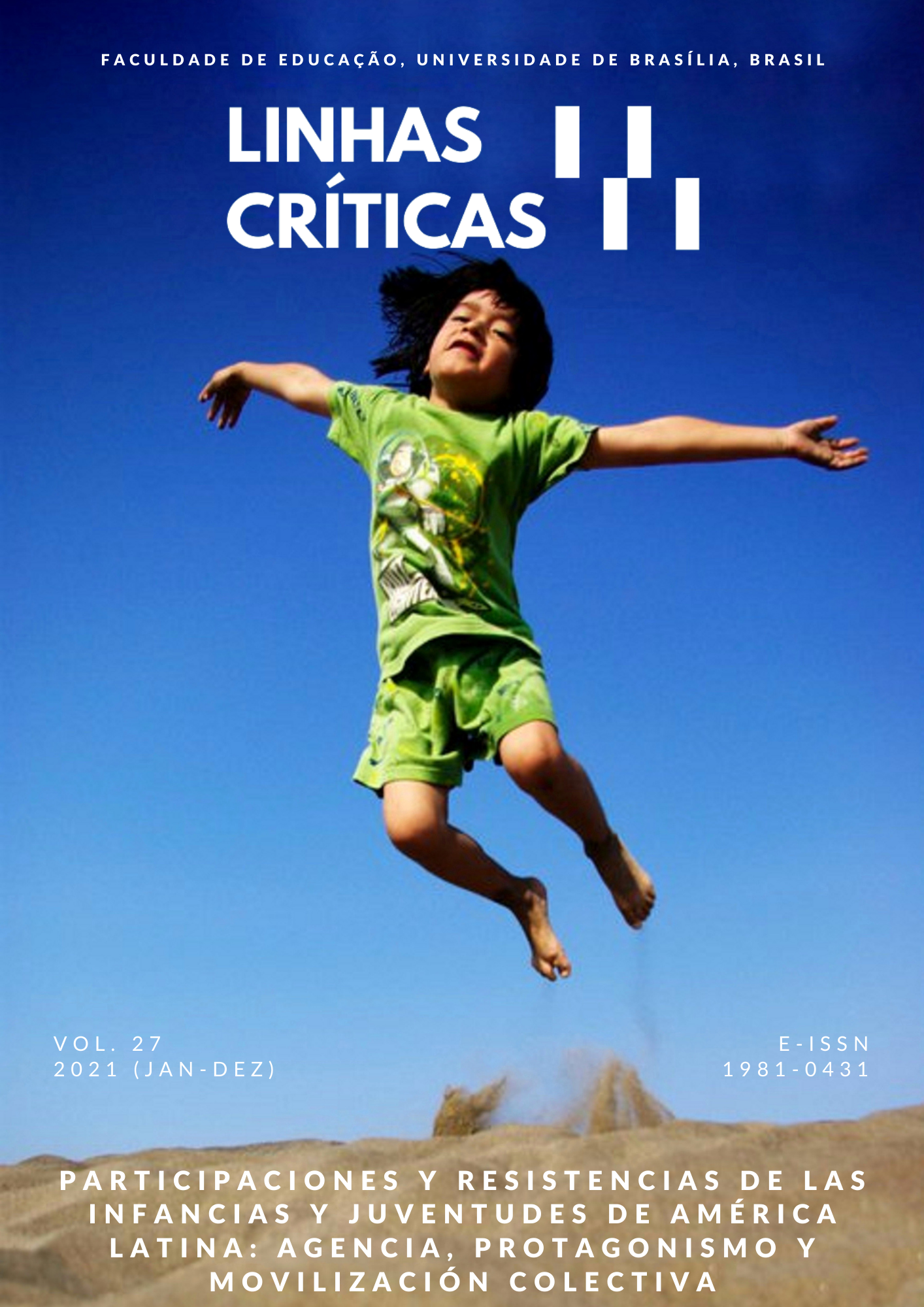Performative pedagogy in the digital culture
DOI:
https://doi.org/10.26512/lc.v27.2021.30350Keywords:
Technology, Performative pedagogy, Digital cultureAbstract
Hermeneutic reflection problematizes a performance pedagogy as a learning, procedural and realizing saber of the subject's, revealed in the attitude of giving meaning to the digital world. If technologies interfere directly in the performative language and in all dimensions of human activity, because they carry socio-cultural representations and beliefs. It is about showing that architectural of humanity is inseparable from expressive and technical gestures, from the intersubjective relationship and from communicative experiences. It is necessary to experience the digital culture in performing knowledge work with the other, to face the hypercomplex reality.
Downloads
References
Adorno, T. W. (1995). Educação e Emancipação. Paz e Terra.
Antunes, J. (2012). Carta dirigida a professores encontrada em concentração nazista. Blog Acervo de Professor. https://acervodeprofessor.blogspot.com/2012/11/carta-dirigida-professores-encontrada.html
Bannell, R. I., Duarte, R., Carvalho, C., Pischetola, M., Marafon, G., & Campos, G. H. B. (2016). Educação no século XXI: cognição, tecnologias e aprendizagens. Vozes.
Benjamin, W. (1991). Walter Benjamin. Ática.
Benjamin, W. (2002). Reflexões sobre a criança, o brinquedo e a educação. Duas Cidades.
Camus, A. (2007). O mito de Sísifo. Record.
Chauí, M. (1996). Convite à filosofia (12. ed.). Ática.
Conte, E. (2012). Aporias da performance na educação. [Tese de Doutorado, Universidade Federal do Rio Grande do Sul]. Repositório institucional da UFRGS. https://www.lume.ufrgs.br/handle/10183/40493
Conte, E. (2013). Aporias da performance na educação. Revista Brasileira de Educação, 18 (52), 81-99. https://www.scielo.br/pdf/rbedu/v18n52/06.pdf
Conte, E. (2020). Perspectivas da performance docente à luz das tecnologias digitais. Educação em revista, 36, e62506. https://revistas.ufpr.br/educar/article/view/62506/41205
Conte, E., & Martini, R. M. F. (2015). As Tecnologias na Educação: uma questão somente técnica? Educação & Realidade, 40 (4), 1191-1207. http://doi.org/10.1590/2175-623646599
Dowbor, L. (2013). Tecnologias do Conhecimento - os desafios da educação. Vozes.
Feenberg, A. (2017). Entre a razão e a experiência: ensaios sobre tecnologia e modernidade. MIT Press.
Flick, U. (2009). Introdução à pesquisa qualitativa (3. ed.). Artmed.
Flusser, V. (2008). O universo das imagens técnicas: elogio da superficialidade. Annablume.
Freire, P. (1984). A máquina está a serviço de quem? Revista BITS, 1 (7), 6.
Gadamer, H.-G. (2002a). Verdade e método II: complementos e índice. Vozes.
Gadamer, H.-G. (2002b). Verdade e método (4. ed.). Vozes.
Gonçalves, J. C., & Silva, M. F. G. (2019). (Re)inventar-se professor no olho do furacão. Revista de Educação, Ciência e Cultura, 24 (1), 7-10. http://doi.org/10.18316/recc.v24i1.5628
Habermas, J. (1987). Teoría de la Acción Comunicativa I: Racionalidad de la Acción y Racionalización Social. Taurus.
Habermas, J. (1990). O Discurso Filosófico da Modernidade. Dom Quixote.
Habermas, J. (1994). Técnica e ciência como ideologia. Dom Quixote.
Habermas, J. (2009). Verdade e Justificação: ensaios filosóficos (2. ed.). Edições Loyola.
Habowski, A. C., Conte, E., & Trevisan, A. L. (2019). Por uma cultura reconstrutiva dos sentidos das tecnologias na educação. Educação & Sociedade, 40, e0218349. http://doi.org/10.1590/es0101-73302019218349
Han, B.-C. (2018). Psicopolítica: o neoliberalismo e as novas técnicas de poder. Âyiné.
Heidegger, M. (1994). Conferencias y artículos. Ediciones del Serbal.
Johnson, S. (1997). Cultura da Interface: como o computador transforma nossa maneira de criar e comunicar. Jorge Zahar.
Marcuse, H. (1999). Tecnologia, Guerra e Fascismo. Editora da UNESP.
Marfim, L., & Pesce, L. (2020). Formação inicial do pedagogo para integrar as TDIC Ã s práticas educativas: um estudo de caso. Revista Eletrônica de Educação, 14, e2544006. http://doi.org/10.14244/198271992544
Pineau, E. L. (2010). Nos Cruzamentos entre a Performance e a Pedagogia: uma revisão prospectiva. Educação e Realidade, 35 (2), 89-113. http://doi.org/10.14244/198271992544
Recuero, R. (2012). A conversação em rede: Comunicação mediada pelo computador e redes sociais na Internet. Sulina.
Santaella, L. (2001). Matrizes da linguagem e pensamento sonoro, visual, verbal: aplicações na hipermídia. Iluminuras.
Santaella, L. (2005). Potenciais e desafios da sociedade informacional. Anais do 9º Congresso Mundial de Informação em Saúde e Bibliotecas, Salvador, Bahia, Brasil. http://www.icml9.org/program/public/documents/salvadorsantaella-141204.pdf
Santos, M. E. E. (2015). Educação e Contemporaneidade em Michel Serres. Pro-Posições, 26 (1), 239-257. https://doi.org/10.1590/0103-7307201507615
Sartori, G. (2000). Homo Videns - televisão e pós-pensamento. Terramar.
Schechner, R., Icle, G., & Pereira, M. A. (2010). O que pode a Performance na Educação? Uma entrevista com Richard Schechner. Educação e Realidade, 35 (2), 23-35. https://seer.ufrgs.br/educacaoerealidade/article/view/13502/7644
Wittgenstein, L. (1968). Tratactus Lógico-Philosophicus. Editora Nacional.
Zumthor, P. (2000). Performance, recepção e leitura. Educ.
Additional Files
Published
How to Cite
Issue
Section
License
Copyright (c) 2021 Elaine Conte

This work is licensed under a Creative Commons Attribution 4.0 International License.
Authors who publish in this journal agree to the following terms:
-Authors maintains the copyright and grants the journal the right of first publication, the work being simultaneously licensed under the Creative Commons Attribution License which allows the sharing of the work with recognition of the authorship of the work and initial publication in this journal.
- Authors are authorized to enter into additional contracts separately, for non-exclusive distribution of the version of the work published in this journal (eg publish in institutional repository or as a book chapter), with acknowledgment of authorship and initial publication in this journal.
-Authorers are allowed and encouraged to publish and distribute their work online (eg in institutional repositories or on their personal page) at any point before or during the editorial process, as this can generate productive changes as well as increase the impact and the citation of published work (See The Effect of Free Access).



